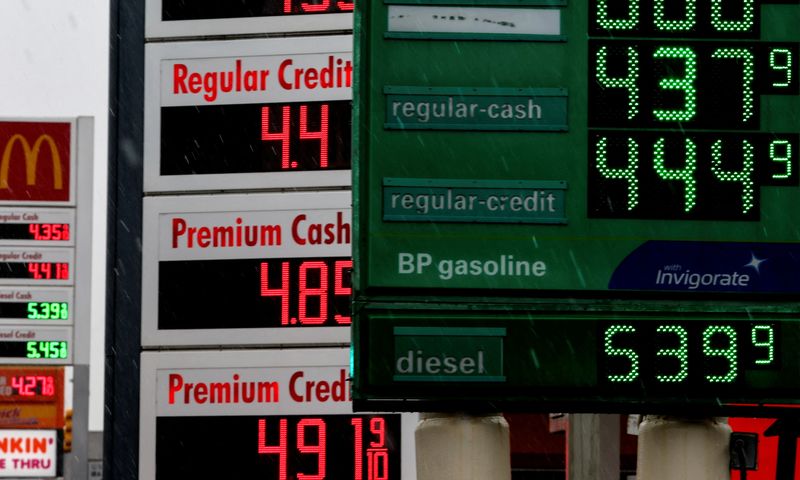U.S. states float tax breaks to ease pain at the gas pump
Reuters
Published Mar 10, 2022 10:14AM ET
Updated Mar 10, 2022 05:11PM ET

By Rich McKay and Sharon Bernstein
(Reuters) - A surge in U.S. retail gasoline prices to record highs has prompted governors and lawmakers in several states to consider slashing their fuel taxes and to ramp up pressure on the federal government to do the same.
The push reflects worries in state governments that the rapid spike in fuel costs could hurt motorists and chill local economies, and that federal efforts to keep prices down so far have been insufficient.
"Today I am announcing that, at this time of global uncertainty, we are working on an emergency suspension of the gas tax to help with the pain at the pump," Maryland Governor Larry Hogan, a Republican, said on Thursday in a Tweet. The state has a 36.9 cent per gallon gas tax.
Georgia Governor Brian Kemp, a Republican, said earlier this week he was working with legislators to suspend the state's roughly 29 cent per gallon tax, citing "a total failure of leadership in Washington" to curb fuel prices.
Governors and lawmakers in California, Florida, Maine, Michigan, New York, Tennessee and elsewhere are making similar moves. Meanwhile, a coalition of six Democratic governors – from Colorado, Michigan, Minnesota, Pennsylvania, New Mexico, and Wisconsin – sent a letter this week to U.S. congressional leaders, asking them to support a bill to lift the nation’s 18.4 cent per gallon federal tax.
“Money saved at the pump translates into dollars back in consumers’ pockets for groceries, childcare, rent, and more,” they wrote.
U.S. consumer prices surged in February, culminating in the largest annual increase in 40 years, and inflation is poised to accelerate further in the months ahead.
Pump prices struck $4.38 on average nationwide on Thursday, according to motorist group AAA, driven in part by rising global demand and the disruption of Russian oil supplies since Moscow’s invasion of Ukraine.
The administration of U.S. President Joe Biden, which announced a ban on Russian oil imports this week, has attempted to curb rising consumer energy prices by orchestrating the release of crude oil stockpiles from emergency reserves in concert with other consumer nations.
The White House has said it is studying additional moves to blunt the impact on U.S. fuel consumers, and administration officials have called on domestic and foreign energy producers to drill more oil quickly to stabilize the market.
Taxes, however, make up a significant chunk of prices at the pumps. They include the 18.4 cent federal gas tax, along with state and local levies that can vary broadly from below 10 cents to nearly 60 cents per gallon.
State and local governments collected a combined $52 billion in revenue from motor fuel taxes in 2019, according to the Urban Institute. Most of that money is diverted to transportation spending, including for road, bus and metro systems.
Florida lawmakers agreed on Wednesday to suspend the state's roughly 27-cent gasoline tax starting in October.
Michigan's legislature, meanwhile, announced its plans to vote on a six-month suspension of the state's 27.2 cent a gallon fuel tax. Michigan's Senate Majority leader Mike Shirkey, a Republican, estimated that the move would save drivers about $750 million.

In New York, state lawmakers from both parties are calling for a suspension of the state's 48 cent per gallon gas tax. Governor Kathy Hochul said Monday she is speaking with her budget office about the potential budget impact.
California Governor Gavin Newsom, a Democrat, meanwhile, said Tuesday that his administration was developing a proposal to offer Californians a tax rebate to help cover the rising costs of fuel.
Written By: Reuters
Trading in financial instruments and/or cryptocurrencies involves high risks including the risk of losing some, or all, of your investment amount, and may not be suitable for all investors. Prices of cryptocurrencies are extremely volatile and may be affected by external factors such as financial, regulatory or political events. Trading on margin increases the financial risks.
Before deciding to trade in financial instrument or cryptocurrencies you should be fully informed of the risks and costs associated with trading the financial markets, carefully consider your investment objectives, level of experience, and risk appetite, and seek professional advice where needed.
Fusion Media would like to remind you that the data contained in this website is not necessarily real-time nor accurate. The data and prices on the website are not necessarily provided by any market or exchange, but may be provided by market makers, and so prices may not be accurate and may differ from the actual price at any given market, meaning prices are indicative and not appropriate for trading purposes. Fusion Media and any provider of the data contained in this website will not accept liability for any loss or damage as a result of your trading, or your reliance on the information contained within this website.
It is prohibited to use, store, reproduce, display, modify, transmit or distribute the data contained in this website without the explicit prior written permission of Fusion Media and/or the data provider. All intellectual property rights are reserved by the providers and/or the exchange providing the data contained in this website.
Fusion Media may be compensated by the advertisers that appear on the website, based on your interaction with the advertisements or advertisers.